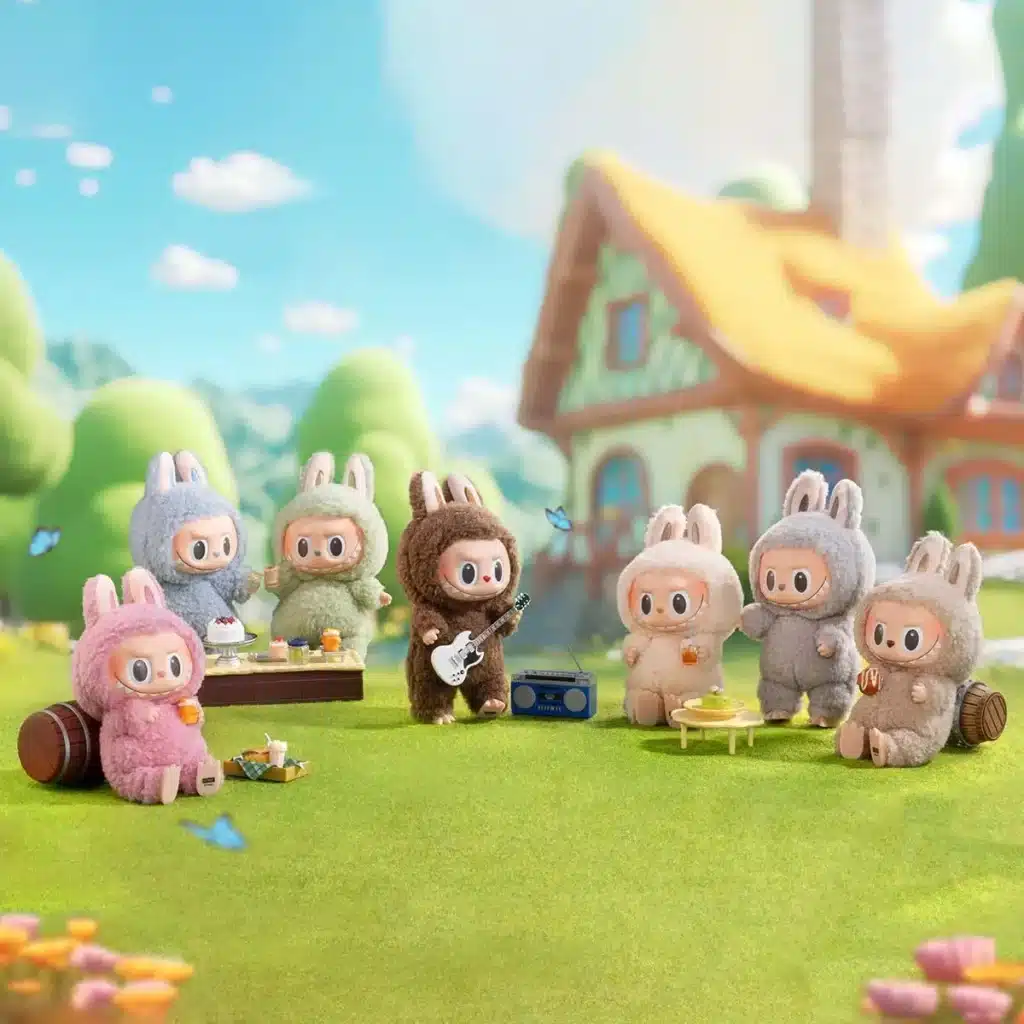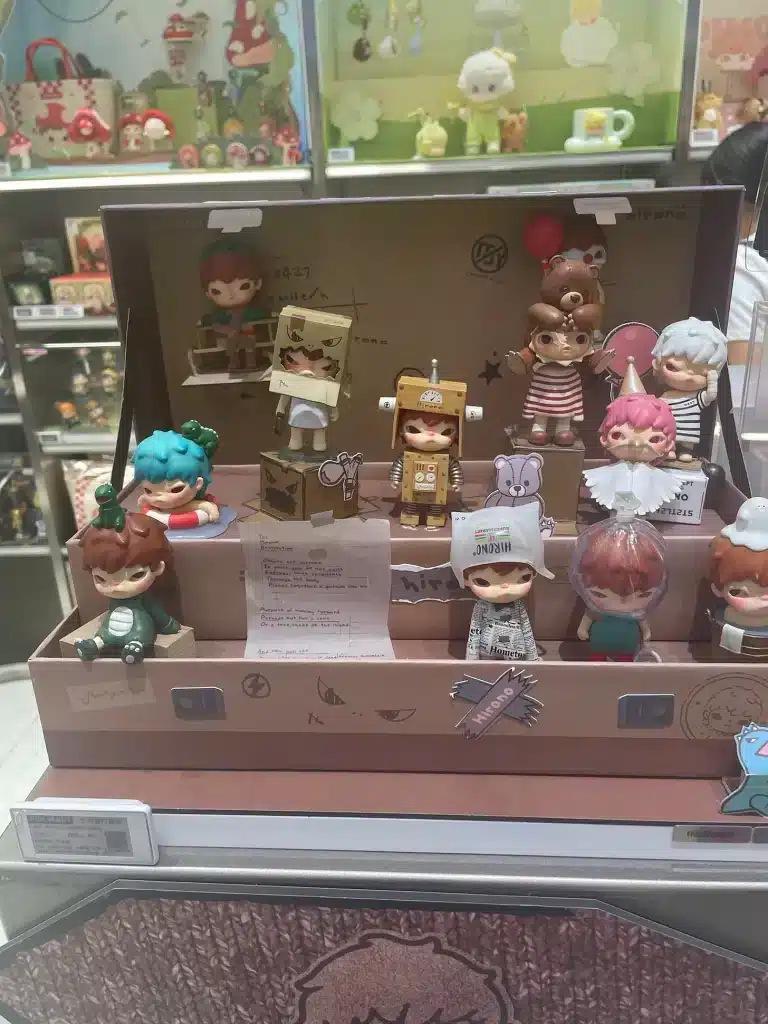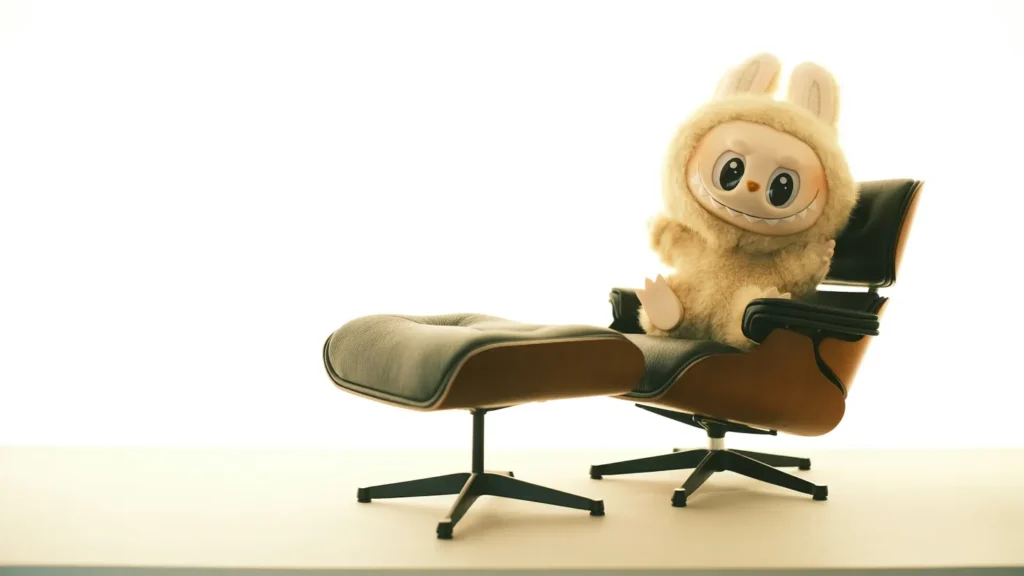Not to brag, but I was a Pop Mart fan before American influencers and Rihanna started promoting Labubu. When visiting Beijing last summer, my friend took me to China World Mall, an astoundingly huge shopping mall with what felt like a million different amenities, including an indoor ice-skating rink, Western luxury brand stores, restaurants of all cuisines, and a German bar with a life-size car decoration spinning from the ceiling and a stunning view of the skyline. The main attraction, however, was Pop Mart.
As I entered the brightly lit store with its neon signs and alluring display cases, the first words out of my mouth were, “Uh, we don’t have these in America.” My trip to China as a whole emphasized that there were many areas where America was falling behind (green energy and technology, for instance), but I did not expect China to be winning at what we do best: consumerism.
Pop Mart felt cleaner, more futuristic, and more enticing than collector or toy stores in the United States. The figures displayed in the cases were cuter, more creative, and of better quality than popular American brands like FunkoPop. I think it’s fair to say that the Labubu has an “ugly-cute” appearance that makes it all the more interesting. Consumers aren’t into perfect Barbie dolls or cute but simplistic Beanie Babies anymore. They want the creepy-cute monsters and eccentric characters of the Pop Mart world. And the gambling of it all, the blind box aspect, makes such a collection even more appealing.
The loss of American cultural hegemony comes in the form of a plush keychain with a toothy grin and bunny ears. Enter Labubu: a Pop Mart character whose most popular form is a keychain that comes in a $27.99 “blind box.”
Labubu started as a storybook character created by Hong Kong artist Kasing Lung, who was inspired by Nordic fairy tales. Lung later released a toy series inspired by the storybook character, which did not become a global sensation until 2019, when Lung partnered with Pop Mart.
Although they have been around for a decade, Labubu has seen a phenomenal increase in popularity this year, especially in the United States. According to CNN, Pop Mart’s revenue surged to $1.8 billion this year, a 7x increase from 2019. What started the craze? There are three main reasons: influencers and celebrities; childhood nostalgia; and the “lipstick effect.”
The most popular version of Labubu is the “Macaron Vinyl Face Blind Box.” The box contains a 6.7-inch plush keychain that comes in seven different colors. The color the purchaser receives is a surprise, hence the title “blind.” The most coveted of the colors is the “secret” Labubu, of which the odds are 1 in 72. The other six colors have an equal probability of 1 in 6.

While there are many other toys and blind boxes based on the Labubu character, the blind box keychain reached a broader consumer market when “White Lotus” season 3 star Lisa, also a member of the K-pop group Blackpink, posted a Labubu keychain and plush on social media to her 100 million followers. About a year later, in May 2025, Rihanna was spotted with a pink Labubu keychain attached to her Louis Vuitton tote at the airport. The Labubu became a fashion accessory in the public eye, along with its status as a toy, art piece, and collectible.
Blind boxes as a whole have become more popular since 2024. Influencers on platforms like TikTok and Instagram have posted “unboxing” videos featuring Pop Mart collectibles but also blind boxes from places like Five Below, Target, and Dollar Tree. Their popularity seems to come from the sense of childhood nostalgia brought on by opening a gift or collecting toys. There is also the addictive gambling element — hoping to choose the blind box that has the figure you most desire or to find a coveted “rare” or “secret” item. Especially for the relatively affordable blind boxes, it is easy to justify buying just one more to see if you can pull a favorite.
The addictive gambling appeal of blind boxes and their relatively innocuous price tag has led to internet discourse about Labubu being the newest version of the “Lipstick Effect.”
The name “Lipstick Effect” comes from the economic phenomenon that consumers are more willing to buy luxury items during economic downturns or recessions. For example, Estée Lauder lipstick sales increased post-9/11. The logic behind the phenomenon is that since recession makes long-term purchases like a house or car feel out of reach, consumers turn to smaller, short-term luxury purchases like an expensive lipstick.
Could Labubu be a sign of Americans dealing with the spiraling Trump economy? While they only cost $27.99 from the Pop Mart website or store, Labubu are almost impossible to get from the original source. When they are restocked, they sell out almost instantaneously. Many collectors have turned to resellers like eBay, where the price is usually around $50 to $60. Perhaps indulging in a $50 keychain is consumers’ way of dealing with sky-high inflation rates.
However, some Labubu spending has surpassed recession justification. If serious collectors are set on finding the “secret” Labubu, CNN predicts they could spend an average of $2,000 to beat the 1 in 72 odds. Some of Labubu dolls have sold for as much as $5,000 on the bidding website StockX. Because of the collector craze, some commentators have compared Labubu to the 90s’ Beanie Babies fad.

The United States, however, is not the main market for Labubu. While they have surged in popularity globally, Beijing is where the first Pop Mart opened in 2010. The blind box industry in China has been consistently expanding. According to one report, “the sector increased from 6.3 billion RMB in 2015 to 34.5 billion RMB in 2021, and is projected to reach 110.1 billion RMB by 2026.” Consumers in China are also willing to spend more and more on blind boxes. Recently, a one-of-a-kind human-size Labubu sold in China for $150,000.
The blind box craze in China has become so intense that the CCP’s official newspaper cautioned Chinese youths about an “addiction” to such items. The newspaper called the phenomenon “out-of-control” and claimed that such “unknown surprises” create a “commercial trap.” While the Chinese government has cracked down on other “gambling” industries like video games, they have yet to enforce any regulatory measures on blind boxes. Considering their huge commercial success, such government action would probably be hugely unpopular.
American vs. Chinese Cultural Hegemony

Labubu is not the first sign of waning American cultural hegemony. TikTok is a Chinese-owned brand, and while the influencers Americans enjoy watching might or might not be Chinese, the algorithm and platform is Chinese designed. Temu, an online marketplace owned by Chinese businessman Colin Huang, and Shein, another Chinese-owned online marketplace that sells criminally (literally) inexpensive clothes, are starting to rival Amazon. China’s AI company DeepSeek has also seen success globally. If you expand the lens to include more of the Eastern hemisphere, cultural phenomena like K-pop and Japanese anime have been increasing in popularity in Western markets for years or even decades.

Chris Pereira, founder and chief executive of consultancy firm iMpact, told BBC News, “BYD, DeepSeek, all of these companies have one very interesting thing in common, including Labubu. They’re so good that no one cares they’re from China. You can’t ignore them.”
What does it mean for America? While it might seem like the Labubu is a trivial, short-term fad, coupled with Trump’s increasingly isolationist policies, it represents a shift in public interest. Consumers do not actually want “Made in America” products. Historically, that has been because they do not want to suffer the cost or pollution impacts of Made in the U.S.A. industries, but it seems that American products might also be boring compared to artists and manufacturers in the rest of the world.
China seems to recognize Labubu’s soft power potential. Xinhua news saidLabubu, “shows the appeal of Chinese creativity, quality and culture in a language the world can understand,” giving the world the chance to see “cool China.”
Culture is powerful. The United States has long reaped the benefits of dispersing its products and brands all over the world, dominating the film industry through Hollywood, and pumping out globally sensational pop stars. When you control culture, you control narrative, value systems, and beliefs.
Back in 2019, a Time article focused specifically on the decline of Hollywood for global audiences. Time journalist Fatima Bhutto wrote, “Those abandoned by capitalism and globalization have turned their loyalties away from Hollywood. The pop culture being produced out of India, Turkey and South Korea – to say nothing of China, which is a separate story altogether – exposes the twentieth century Western cultural tsunami as receding and revealing the seashore. Its tide has been broken.”
The symbol of Labubu has even been used in recent American protests and rallies. People were spotted dressed up as the character at a Los Angeles Pride parade and the June protests against recent immigration raids. In an image taken at the protest, a person in a pink Labubu suit is seen holding up a peace sign and a poster that says “ICE Out of LA.” At the Pride parade, Labubu was seen proudly waving a transgender pride flag. Perhaps the Labubu has become somewhat of a countercultural symbol in some circles.
Believing in a product often means believing in that product’s source or creator, whether explicitly or implicitly. As America withdraws from the world and the world withdraws from America, it is no surprise that the global shift would also be represented in shopping habits and internet trends.
Just as I was starstruck by the Pop Mart I visited in Beijing, the world is starstruck by the Labubu. China will likely reap the economic and cultural benefits of such commercial success.
Miranda Wilson is managing editor of the U.S.-China Perception Monitor and a J.D. candidate at Vanderbilt Law School.
The views expressed in this article represent those of the author(s) and not those of The Carter Center.

